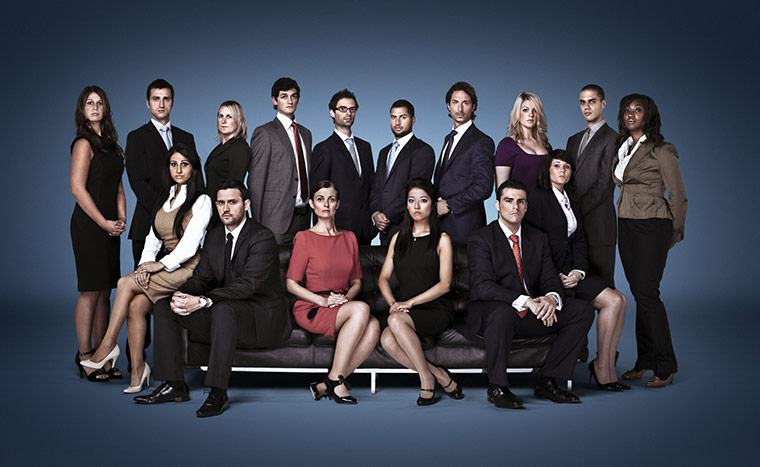Last night's finale of The Apprentice (UK) threw up the 'blaahdiest' of all surprises: Tom Pellereau, quirky inventor, serial loser (he had a record 8 losses out of 11 tasks coming into the finals) and all-round nice-guy, walked away with a £250,000 investment and 50-50 partnership with business mogul Lord Alan Sugar. (If you missed the episode, you can catch-up on BBC iPlayer here.) On a reality show renowned for its back-stabbing and bitchiness, what can we learn from this feel-good victory?
1. Be grateful, especially for the bad times.
A few weeks ago, on the profile 'Final Five' episode, we learnt that Tom suffers from dyslexia. Rather than being embittered about his disability, Tom credits dyslexia for his creativity and scientific mindset. Unable to keep pace with other students at school, Tom started to think 'outside the box' and approach problems with a fresh pair of eyes (sorry for the cliches!) Viewers saw a particularly good example of this on the last task ('Fast Food Chain'), where Tom was able to come up with the winning brand, 'MyPy', by thinking 'dyslexically' (his word).
In the Spiritual Exercises of St. Ignatius of Loyola, the first step to spiritual growth is gratitude. As difficult as it can be to be grateful for the cards Life sometimes deals us, we can always look forward to a draw when those cards give us the nuts (using a poker analogy).
2. It pays to be nice.
Despite what Green Day says, nice guys don't finish last. A persistent myth about business is that it pays to be a cunning, two-faced, selfish schemer. Long-term success does not depend on checking your morals, and manners, at the door ala Wall Street's Gordon Gekko. The bankers'-greed-driven-recession and ongoing crisis at Rupert Murdoch's media empire should provide sufficient evidence of that.
Through the series, none of Tom's fellow-contestants had a bad word to say about him. He was always a real gentleman in his dealings with others; his criticism in the boardroom, while harsh, was never personal. None of the sly undermining and blame games we've come to see in past seasons.
3. Be generous in your concern and respect for others.
Related to the point above, part of the reason that Tom was so universally liked on the show, and the fan-favourite, was that his respect for his fellow-team-members was never feigned or temporary. Even when project leaders rode roughshod over his insights, and usually to their own detriment, he never wavered in his generosity, enthusiasm and cooperation on tasks and respect for their persons.
Unfortunately, modern culture pressurises to limit our generosity and concern for others. We're always concerned about our rights, but rarely about our responsibilities. We're encouraged to pamper ourselves (and there's nothing wrong with an occasional treat) but rarely encouraged to think about others, particularly those less fortunate.
4. Make the best of your flow.
'Flow' is a term in psychology that refers to a mental state of well-being and harmony whilst engaged in some activity one is particularly good at. While in flow (or 'in the zone', to use another way of expressing it), one's performance level on the task is elevated beyond normal and one is able to tackle sterner challenges than one normally might. In a broader sense, we can think of flow as an attitude that recognises one's capabilities and competencies and maximises these.
In the series, many otherwise-capable candidates fell short because of their inability to make the best of what they're good at. Right at the start of the current season, competitor Edward, a practising accountant, engaged in 'contra-flow' (working against his accounting skills) and was fired in the very first episode. For Tom, however, it was clear that his skills lay in his creativity, his product-focus, and his analytical skills; and it is precisely these skills he put to best use through the season. While he didn't shirk responsibilities outside his comfort zone, he was always going to rely on his strengths first. Of course, in the end, it was his ability as an inventor that swayed Lord Sugar's final decision. Runner-up Helen made the unfortunate decision to act contra-flow in the final stage and leave behind her experience in the food industry; and duly lost despite the best winning record (10 out of 11) in The Apprentice history.
There is an analoguous concept in Ignatian spirituality known as spiritual consolation. Spiritual consolation is a state of soul where one is completely 'inflamed with love of [one's] Creator and Lord' (Spiritual Exercises, para [316]). Spiritual directors advise a person who is experiencing consolation to remain patiently in that state until they are content. As far as possible, persons are advised to make major decisions whilst in consolation and not to change them whilst in spiritual desolation (the contrary of spiritual consolation).
5. It's cool to be a nerd.
 |
| The Apprentice 2011 Winner - Tom Pellereau |
'Nuff said.


Brilliant! Great combination of wit and Ignatian wisdom, thank you!
ReplyDelete